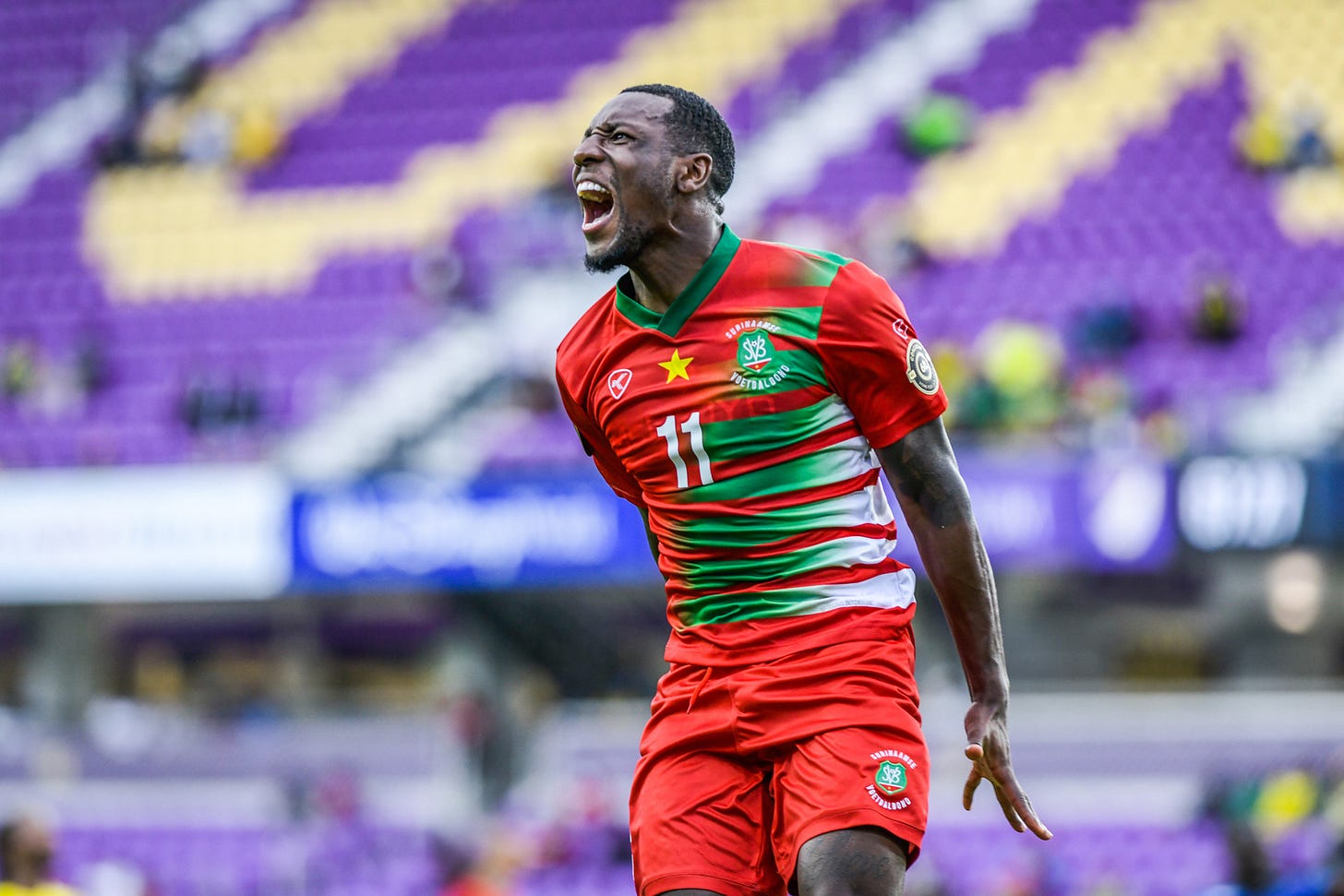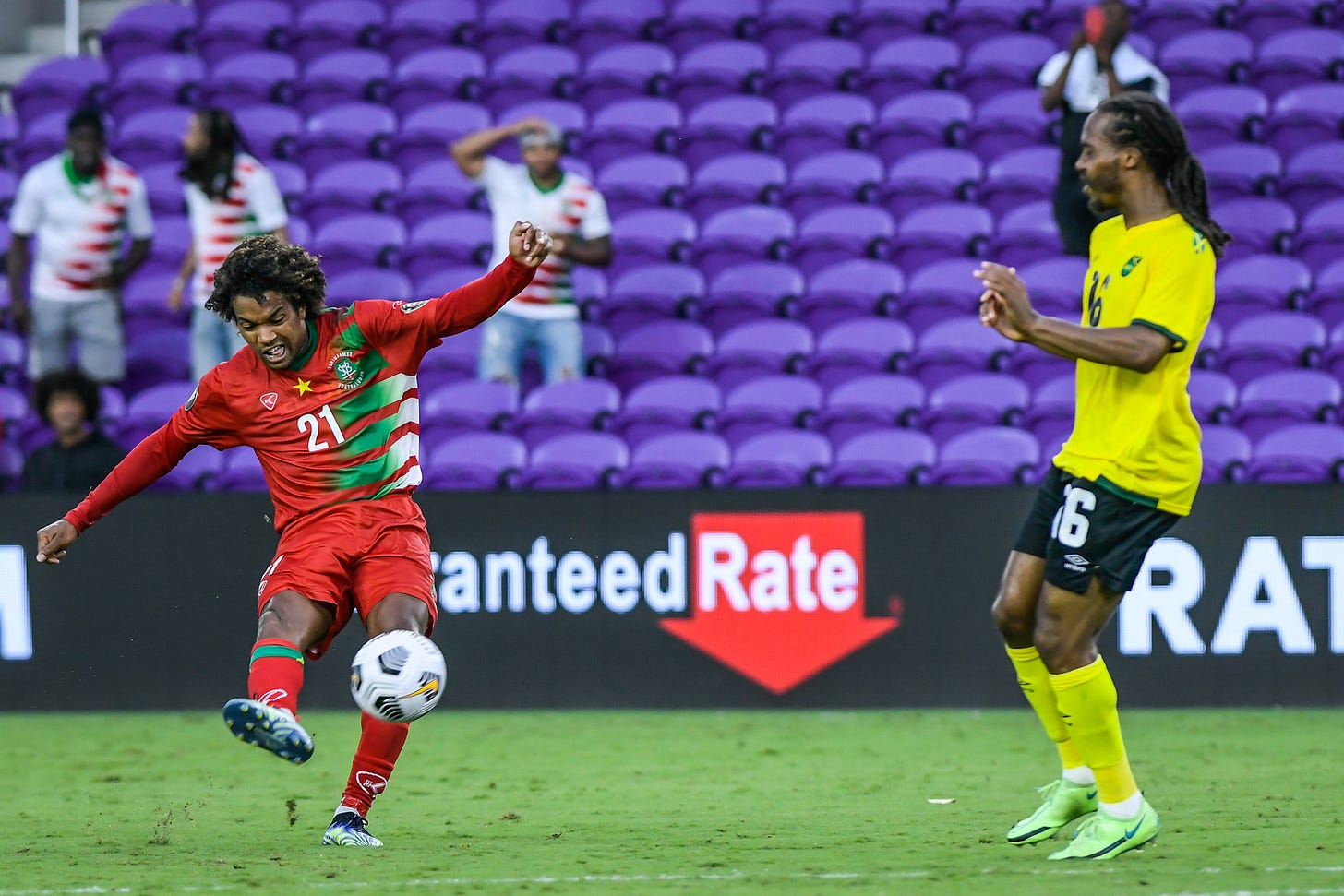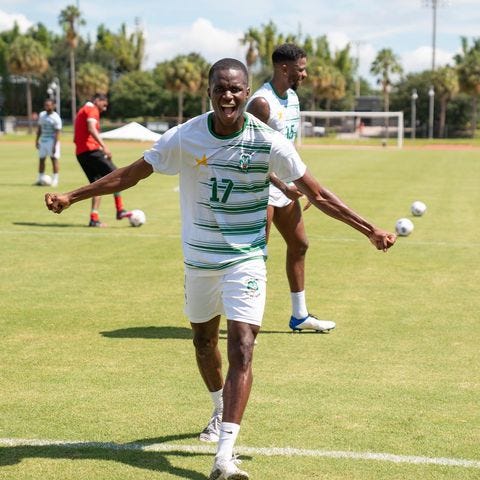🇸🇷 Suriname's surge sits between bittersweet past, bright future
How an infamous president helped pave the way for Suriname to compete with Concacaf's best
The Suriname men’s national team will line up one more time tonight to sing the anthem, take in the environment and look for their first-ever point at the Gold Cup.

They’ll look to make the most of it. Suriname’s core of veterans know they’ll only have so many meaningful international games.
Some may quibble about that designation: Meaningful. Already eliminated from the Gold Cup, Suriname’s match against Guadeloupe may seem academic from afar, but players like captain Ryan Donk, who will win his seventh cap at age 35, will take all the international matches they can get.
Many soccer fans in the region have registered the boom of players based abroad that flooded Suriname’s roster for World Cup qualification in March. Few understand how hard they’ve had to fight to get here, how their dreams of playing with the yellow star on their chest rested first in the hands of politicians - among them a president with an infamous past - and later with soccer’s governing officials.
Clearing the hurdles
“The process is a long story. I mean, since I was 18, 19 years old, born in Suriname, raised in Holland, I wanted to play for Suriname because my father said Suriname is the land of milk and honey,” Suriname manager Dean Gorre, now 50, tells me earlier this month on a Zoom call.
In his second stint at the helm of the national team, Gorre decided to pull out all the stops and push to get the best players who in theory would be eligible for the country to actually be able to play. It wasn’t about convincing the players first but rather the government, which had a law in place prohibiting anyone from holding two passports.
As badly as they may have wanted to play for Suriname, convincing players to give up their passports from the Netherlands and the privileges that come with it wasn’t going to happen, but Gorre met with government officials for several years and eventually was able to get a breakthrough with Suriname issuing passports to eligible athletes in 2019.
“We qualified for the Gold Cup with amateurs, which was fantastic. After that, we constantly spoke to the people in the government” Gorre said. “I told them why it’s so important for us to represent Suriname on the highest level and what the country can achieve from this. Finally, it went into a discussion and they said, ‘We’re gonna make it happen.’”
With that hurdle cleared, Gorre then started making the calls. Several players couldn’t answer quickly enough.
Inter Miami fullback Kelvin Leerdam said he’s been working to represent Suriname since 2014, often dreaming with other players he knew would be eligible about the potential of playing for the national team. Group chats formed, plans were hatched but ultimately it was out of their hands.
“We’ve been waiting with each other for a long time” Leerdam said. “We've been in talks for many, many years. So when the moment was there, it was like a celebration.”
Even after the law in Suriname changed, Leerdam was one of several players who had to wait to be cleared by FIFA and initially was told no before eventually getting the green light.
Outwardly, it came as something of a shock in March when Suriname’s starting XI rolled out for its first World Cup qualification match and featured debuts for goalkeeper Warner Hahn, the entire back line and the entire midfield. To the team, and to fans in the country, it was a long time coming.
A bittersweet history
There weren’t smiles only in Suriname. In the Netherlands, many greats either were born in Suriname or can trace their heritage there and were happy to see the change. Current Dutch internationals Georginio Wijnaldum and Virgil van Dijk both have Surinamese heritage and legends like Clarence Seedorf and Edgar Davids were born in Paramaribo.


As long as the team continues to represent the nation with passion, they’ll likely be warmly received in their home country.
“The only thing you’re always afraid of is that it’s not a Suriname team any more, that only players from Holland play in that team,” Stanley Menzo, the former Ajax goalkeeper who also was born in Suriname, told me this summer. “When you have success, it’s not a problem, but the moment you lose one game, if there’s not success, the people will take a hard look and get on you (with harsh criticism).”
Menzo and Gorre occasionally joined Dutch-based players with Surinamese roots who formed All-Star teams that would travel to the country for exhibitions. Both were set to travel for one such contest in June 1989. Gorre didn’t make the trip after he was called to play with the Netherlands in the Toulon Tournament, and Menzo traveled on an earlier flight rather than with the main group. Those happenstances meant they weren’t aboard Surinam Airways Flight 764, which tragically crashed, killing 178 people including 15 players traveling for the match.
“From that time on, I said everything I’m going to do for Suriname, to help my country to be better in football, to give something back and make it happen,” Gorre said. “Now, my dream came true, obviously not playing for Suriname but coaching Suriname and achieving not only the dreams of other players, but also the dream of the country, the nation itself, to see professional footballers playing in a tournament that they never played before.”
The plane crash is not the only tragic moment in Suriname’s soccer history. Fifteen men who spoke against the country’s military dictatorship in the 1980s were killed in December 1982, an incident known as the December Murders. Among them was a man named Andre Kamperveen, who played for the Suriname national team from 1945-1954 and later managed the team before moving into administration and helping found the Caribbean Football Union. The national stadium now carries Kamperveen’s name.
The de facto leader at the time, Dési Bouterse, long has been implicated in the murders and in 2019 was convicted by a court. At the time, he was in his ninth year as president of Suriname, having been elected in 2010. He lost power in 2020 but not before his government made the changes required to pave the way for Suriname’s eligible athletes to receive passports.
A new future
“I was so busy with my my career in the Netherlands, sometimes you forget about international football now. Now the passports are happening, so for us is a great opportunity to play for country,” said Ajax right back Sean Klaiber, who debuted in Suriname’s opening Gold Cup match, a 2-0 loss to Jamaica.
The 26-year-old Klaiber likely has plenty of international soccer ahead of him and is thrilled to be honoring the memory of his late father, through whom he is eligible for Suriname.
Donk’s father, who currently serves as the team’s press officer, is one of his links to the country as well, and the pride his family feels seeing him represent Suriname is one reason it’s worth it to commit to the project, even with his career closer to its end than its beginning.
“You want to be part of a country that's making history, especially when you're one of the first players who could change the passport,” Donk said. “It's always nice for the family to know that you did everything for the country. Now that we can do something to back, we'll give it (our all) to do it.”
Gorre had some convincing to do at home when he first took the Suriname job, with his wife, who appeared on several seasons of The Real Housewives of Cheshire, not entirely keen on moving to another continent. The couple sometimes struggles to manage the distance, and Dean already hasstayed longer than planned because of the pandemic. Yet, despite the odd frustration with the federation, said he may stay on past the Gold Cup.
He hopes some of that future work includes boosting local-based players, with amateurs who worked as plumbers, firemen and electricians among those who helped the Natio to the Gold Cup in the first place.
Of course, with the passport law sorted and FIFA’s precedent established, there also can be more players who may be playing abroad who also can live out their dream of suiting up for the country of their birth or one their parents have told them about or even that they’ve visited and felt an attachment to.
“Luckily that’s all in the past now,” Leerdam said of the passport fight. “For us, it wasn’t fair, but for future generations in all sports, in everything that can represent Suriname in a good way, this is fantastic.”

After tonight’s match, it will be time for Suriname to start looking to that future, to figure out how to export more players, to fortify the team it can put on the field in the Concacaf Nations League and also to see who else might suit up for Suriname going forward.
“It’s a journey. We cannot start from zero and go directly to 100%,” Donk said. “But now that we have some time to train with each other, know everybody inside and out, get some experience … now we can open more doors for other players to come.”
With a rich soccer heritage, a current generation invested in future success and a desire to continue improving, it’s a safe bet that even if Suriname isn’t able to get its first-ever Gold Cup result tonight, it will have another opportunity soon.









Fan de Suriname